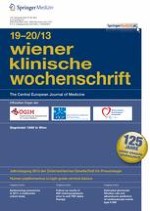01.10.2013 | original article
Culture proven newborn sepsis with a special emphasis on late onset sepsis caused by Enterobacteriaceae in a level III neonatal care unit in Astana, Kazakhstan
Erschienen in: Wiener klinische Wochenschrift | Ausgabe 19-20/2013
Einloggen, um Zugang zu erhaltenSummary
Background
Newborn sepsis is one of the major public health concerns worldwide. Also in our neonatal care unit, it is one of the major problems and especially infections with Enterobacteriaceae were noted to pose an increasing problem in the last years.
Methods
Data collection was done retrospectively for 2011. Early onset sepsis was defined as having a positive blood culture within 72 h and late onset sepsis after 72 h of delivery.
Results
Out of 599 patients being admitted, 58 newborns were assessed having a neonatal sepsis. Of these 58 newborns with sepsis, 11 were diagnosed within 72 h post delivery (early onset) and 47 were diagnosed after 72 h post delivery (late onset).
The percentage of Enterobacteriaceae causing late onset sepsis was 57.5 %. Among these, Klebsiella
pneumoniae could be isolated in 29.8 %, Enterobacter
cloacae in 12.8 %, Enterobacter
aerogenes in 8.5 %, and Escherichia
coli in 6.4 % of late onset sepsis. Majority of the strains showed a resistance to antibiotics used in empiric treatment. Antibiotic prophylaxis/treatment from birth until the onset of late onset sepsis could be analyzed in 20 out of 27 newborns with late onset sepsis caused by Enterobacteriaceae. A regimen of empirical antibiotic treatment containing aminopenicillin and/or gentamicin was administered in 16 newborns and that of cephalosporin in 14 out of 20 newborns for at least 5 days before onset of sepsis.
Conclusions
The association of empiric long-term antibiotic treatment and the high number of late onset sepsis with often multiresistant Enterobacteriaceae might be causal and urges for a change in general antibiotic prophylaxis/treatment in newborns admitted to the neonatal care unit of our hospital.
Anzeige
